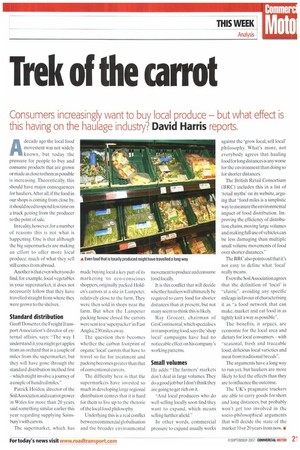Trek of the carrot
Page 21

If you've noticed an error in this article please click here to report it so we can fix it.
Consumers increasingly want to buy local produce — but what effect is
this having on the haulage industry? David Harris reports.
Adecade ago the local food movement was not widely known, but today the pressure for people to buy and consume products that are grown or made as close to them as possible is increasing. Theoretically, this should have major consequences for hauliers. After all, if the food in our shops is coming from close by, it should need to spend less time on a truck getting from the producer to the point of sale.
In reality, however,for a number of reasons this is not what is happening. One is that although the big supermarkets are making an effort to offer more local produce, much of what they sell still comes from abroad.
Another is that even when you do find, for example, local vegetables in your supermarket, it does not necessarily follow that they have travelled straight from vythere they were grown to the shelves.
Standard distribution Geoff Dossetter, the Freight I urnsport Association's director of external affairs, says: -The way I understand it, you might get apples from an orchard that is a couple of miles from the supermarket, but they will have gone through the standard distribution method first which might involve a journey of a couple of hundred miles."
Patrick Holden, director of the Soil Association and a carrot grower in Wales for more than 20 years, said something similar earlier this year regarding supplying Sainsbury's with carrots.
The supermarket, which has made buying local a key part of its marketing to eco-conscious shoppers, originally packed Holden's carrots at a site in Lampeter. relatively close to the farm. They were then sold in shops near the farm. But when the Lampeter packing house closed the carrots were sent to a 'superpacker' in East Anglia. 230 miles away The question then becomes whether the carbon footprint of organic 'local' carrots that have to travel so far for treatment and packing becomes greater than that of conventional carrots.
The difficulty here is that the supermarkets have invested so much in developing large regional distribution centres that it is hard for them to live up to the rhetoric of the local food philosophy.
Underlying this is a real conflict between commercial globalisation and the broader environmental movement to produce and consume food locally.
It is this conflict that will decide whether hauliers will ultimately be required to carry food for shorter distances than at present, but not many seem to think this is likely.
Ray Grocott, chairman of GroContinental,which specialises in transporting food, says the 'shop local' campaigns have had no noticeable effect on his company's working patterns.
Small volumes Ile adds: -Lhe farmers' markets don't deal in large volumes. They do a good job but I don't think they are going to get rich on it.
"And local producers who do well selling locally soon find they want to expand, which means selling further afield."
In other words, commercial pressure to expand usually works against the 'grow local, sell local' philosophy. What's more, not everybody agrees that hauling food for long distances is any worse for the environment than doing so for shorter distances The British Retail Consortium (BRC) includes this in a list of 'retail myths' on its website, arguing that "food miles is a simplistic way to measure the environmental impact of food distribution. Improving the efficiency of distribution chains, moving large volumes and making full use of vehicles can be less damaging than multiple small volume movements of food over shorter distances."
The BRC also points out that it's not easy to define what 'local' really means.
Even the SoilAssociation agrees that the definition of 'local' is "elastic", avoiding any specific mileage in favour of characterising it as "a food network that can make, market and eat food in as tightly knit a way as possible".
The benefits, it argues, are economic for the local area and dietary for local consumerswith "seasonal, fresh and traceable food, delicious local varieties and meat from traditional breeds".
The arguments have a long way to run yet, but hauliers are more likely to feel the effects than they are to influence the outcome.
The UK's pragmatic truckers arc able to carry goods for short and long distances, but probably won't get too involved in the socio-philosophical arguments that will decide the state of the market I 0 or 20 years from now. •
































































































































































































